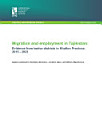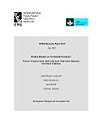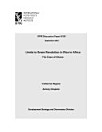Gender attitudes in agriculture and positivity bias: A survey experiment in four countries in Sub-Saharan Africa
Ragasa, Catherine · Lambrecht, Isabel B. · Ma, Ning · Cole, Steven · Ebrahim, Mohammed · Desta, Gizaw · Mersha, Abiro Tigabie · Mudereri, Bester · Kihiu, Evelyne · Kreye, Christine · Peter, Hellen
Sep 2025 · IFPRI Discussion Papers Book 2357 · Intl Food Policy Res Inst
Ebook
48
Pages
family_home
Eligible
info
reportRatings and reviews aren’t verified Learn More
About this ebook
Extensive prior research has demonstrated that reducing gender discrimination enhances women’s empowerment, promotes more inclusive livelihoods, increases agricultural productivity, and improves other development outcomes. This study aims to contribute to documenting and informing the measurement of gender attitudes that relate directly to reaching, benefiting, and empowering women through agricultural innovations. By analyzing data from 8,051 survey respondents across study sites in Democratic Republic of the Congo, Ethiopia, Nigeria, and Rwanda, our findings emphasize both commonalities and differences in gender attitudes across different contexts. Furthermore, by including a survey-based experiment during data collection, we assess whether gender-attitude statements vary depending on whether they are presented in a positive frame (focusing on equality) or in a negative frame (focusing on inequality). On average, rural women and men respondents across all countries supported more than half of the gender-equality statements. Some gender-inequality attitudes persisted across the four countries but varied in magnitude and by location, age group, and specific statement or theme. Framing matters: respondents exposed to a positive framing supported 16 percent more gender-equality statements than those exposed to a negative framing. The study highlights two main implications. First, the findings indicate the importance of considering both restrictive attitudes and those that reflect gender-equality opportunities as being in the vanguard. Accordingly, gender-focused interventions should adopt strategies that challenge normative views of women as supporting rather than leading actors in agriculture and economic activities. Second, gender-attitude measures do not perfectly align with country-level gender-equality indicators or with empowerment at the intrahousehold level. They therefore capture a distinct dimension and merit their own indicators.
Rate this ebook
Tell us what you think.
Reading information
Smartphones and tablets
Install the Google Play Books app for Android and iPad/iPhone. It syncs automatically with your account and allows you to read online or offline wherever you are.
Laptops and computers
You can listen to audiobooks purchased on Google Play using your computer's web browser.
eReaders and other devices
To read on e-ink devices like Kobo eReaders, you'll need to download a file and transfer it to your device. Follow the detailed Help Center instructions to transfer the files to supported eReaders.










